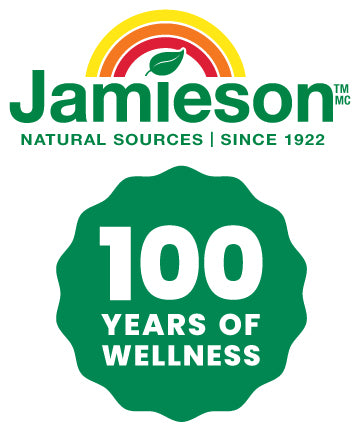If you’re pregnant or considering having a baby, you may be overwhelmed with the amount of nutritional advice available. So let’s start from the basics; It is well known that a prenatal multivitamin is important to take during pregnancy. But did you know that a prenatal multivitamin should ideally be taken up to three months prior to conception? Read on to find out why….
What can a prenatal vitamin do for me?
A Jamieson prenatal multivitamin ensures that you are receiving 100% of your daily recommended vitamin intake. These vitamins are not only required to provide your essential nutrients, but are also crucial for healthy fetal development.
Researchers analyzed 40 separate research trials looking at women (278,413 pregnancies total) taking different vitamins starting before 20 weeks' gestation. They concluded that “evidence showed that women receiving multivitamins plus iron and folic acid had reduced risk for stillbirth”.[i]
What nutrients should you look for in a prenatal supplement?
Folic Acid
All prenatal supplements legally sold in Canada must provide 400 mcg of the vitamin folic acid.[ii] Health Canada states that this amount “helps to reduce the risk of neural tube defects when taken daily at least three months prior to becoming pregnant and during early pregnancy.”[iii] -This is why healthcare professionals recommend that any woman who is even contemplating a pregnancy in their future, should be taking a prenatal supplement.[iv]
Iron
Many prenatal supplements also include iron. Pregnant women require more iron to support the increase in their red blood cells, which supply the growing baby in particular normal brain development. During the 3rd trimester, the baby will also begin storing up iron, which it will need during its first six months of life. A lack of iron during pregnancy can cause: cardiovascular stress, fatigue, a lowered resistance to infection, reduced work capacity, and iron deficiency. Iron deficiency anemia is the most common nutritional deficiency during pregnancy, which can lead to: premature delivery, low birth weight, and an increased risk of infant mortality.[v]
Omega-3
There is another important nutrient for the health of mother and baby that is rarely included in prenatal supplements; Omega-3 fatty acids, and in particular DHA. They are called essential fatty acids as they are essential for your body but only available through certain foods such as fish, nuts and seeds. According to the Public Health Agency of Canada “When you are pregnant, you need more omega-3 fatty acids in your diet. Omega-3 fatty acids travel through your placenta to your baby and support the growth of your baby's brain and tissues”.[vi] There is a specific type of Omega-3 fatty acid called DHA, which is only found naturally in fish, some seafood (such as oysters and caviar) and some algae/seaweeds.[vii]
Unfortunately, many women (myself included) have found the smell and taste of seafood nauseating during pregnancy. For those that can no longer eat fish or are worried about the possible mercury toxicity from available fish, supplementing with DHA is an ideal option. Jamieson’s known for its high-quality products which are tested for possible toxicities starting at source ingredients all the way to finished product; this ensures safety for you and your baby.
Jamieson Prenatal+DHA is formulated for those who are trying to conceive, who are pregnant or breastfeeding. It is a quality all in one, one per day, and easy to swallow prenatal softgel that provides 100% or more of all of Health Canada’s recommended daily vitamins, which includes folic acid, iron[viii] and additional DHA to support the baby’s developing brain.[ix]
Sources
[i] Balogun OO et al. (2016). Vitamin supplementation for preventing miscarriage. Cochrane Database Syst Rev. May 6;(5):CD004073
[ii] Health Canada. (2018). Multi-vitamin/Mineral Supplement Monograph: Table 5. Specific uses or purposes statements for vitamins. Accessed Oct 28, 2018 at: http://webprod.hc-sc.gc.ca/nhpid-bdipsn/atReq.do?atid=multi_vitmin_suppl&lang=eng#a421
[iii] Health Canada. (2018). Multi-vitamin/Mineral Supplement Monograph: Table 5. Specific uses or purposes statements for vitamins. Accessed Oct 28, 2018 at: http://webprod.hc-sc.gc.ca/nhpid-bdipsn/atReq.do?atid=multi_vitmin_suppl&lang=eng#a421
[iv] Health Canada (2013). Prenatal Nutrition Guidelines for Health Professionals - Folate Contributes to a Healthy Pregnancy. Accessed Oct 30, 2018 at: https://www.canada.ca/en/health-canada/services/food-nutrition/reports-publications/nutrition-healthy-eating/prenatal-nutrition-guidelines-health-professionals-folate-contributes-healthy-pregnancy-2009.html
[v] Health Canada (2009). Prenatal Nutrition Guidelines for Health Professionals – Iron Contributes to a Healthy Pregnancy. Accessed Nov 01, 2018 at: https://www.canada.ca/en/health-canada/services/food-nutrition/reports-publications/nutrition-healthy-eating/prenatal-nutrition-guidelines-health-professionals-iron-contributes-healthy-pregnancy-2009.html
[vi] Public Health Agency of Canada.(2014). Omega-3 fatty acids and fish during pregnancy. Accessed Oct 26, 2018 at: https://www.canada.ca/en/public-health/services/pregnancy/omega-3-fatty-acids-fish-during-pregnancy.html
[vii] Dietitians of Canada (2013). Food Sources of Omega-3 fats. Accessed Oct 28, 2018. At: https://www.dietitians.ca/getattachment/de95e92c-3fb3-40db-b457-173de89bdc3a/FACTSHEET-Food-Sources-of-Omega-3-Fats.pdf.aspx
[viii] Health Canada (2009). Prenatal Nutrition Guidelines for Health Professionals – Iron Contributes to a Healthy Pregnancy. Accessed Oct 30, 2018 at: https://www.canada.ca/en/health-canada/services/food-nutrition/reports-publications/nutrition-healthy-eating/prenatal-nutrition-guidelines-health-professionals-iron-contributes-healthy-pregnancy-2009.html
[ix] Health Canada.(2018). Product Information NPN number 80075813. Accessed Oct 28, 2018 at: https://health-products.canada.ca/lnhpd-bdpsnh/info.do?licence=80075813




